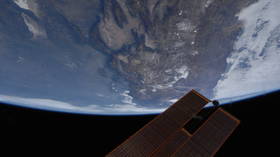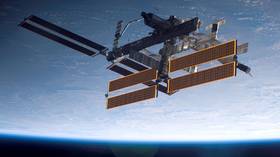
Roscosmos’ head Dmitry Rogozin has not ruled out that a “hostile” geopolitical situation could force Russia to create a new Russian Orbital Service Station (ROSS) as “militarily applicable.”
Speaking to Sputnik radio on Monday, the Russian space agency’s director confessed that if ROSS, planned for launch in 2025, existed now, he would have already ceased cooperation with Western partners on the International Space Station (ISS).
“If we continue to live in this hostile world by the time our orbital service station is deployed and we still have a limited number of allies, then we will make this station militarily applicable,” Rogozin said.
He explained that it will mean “there will be no one” on ROSS besides the Russian cosmonauts, who will “service the target equipment installed at this station.”
However, if the situation changes, and, as Rogozin puts it, “the asphalt is destroyed by new young trees and everything is rosy and blissful,” then Roscosmos will probably think “about some kind of international context.”
However, the head of Roscosmos stressed, a new station in any way should be built as “a national station,” and must be “as simple as possible,” allowing the cosmonauts to stay there for short periods of time to fulfill tasks and to return quickly back to the Earth. According to Rogozin, such an arrangement would be cost-effective.
Commenting on current joint work with the US and other Western countries on the ISS, Rogozin said the current geopolitical situation prevents Roscosmos from proceeding with “business as usual.”
Claiming the “US are the sponsor of the entire bloody Ukrainian story,” and noting the Western sanctions imposed on Moscow over its “denazification policy” in Ukraine, Rogozin stressed that his agency chose to respond “in a tough and demonstrative way” to these actions. He said that he has written to his US, EU, and Canadian counterparts, requesting them to “initiate a review” within their countries on the matter of lifting illegal sanctions.
“Based on the response received at the end of this month, we will make decisions regarding the timeframe of the termination of our joint work at the ISS,” Rogozin explained.
He went on confessing that if he could he would already cease cooperation.
“If ROSS had been deployed already … I would have already made a decision to end cooperation with our international partners, but there is no such thing yet,” Rogozin said.
He explained that the creation of space technologies requires “a certain amount of time,” as safety is the main criterion of such work. Therefore, he argued, if a decision on the termination of partnership has been taken now, there would be “several years of pause.”
“It is very dangerous. All specialists are afraid of such a pause, because competencies may disappear during this gap in experience. For space activities, this is a very critical story,” the head of Roscosmos concluded.
